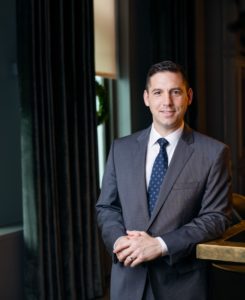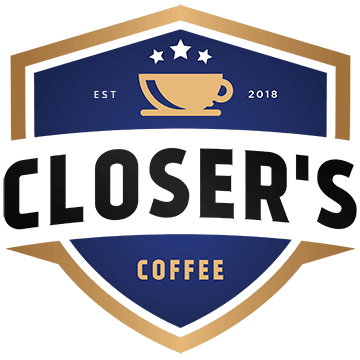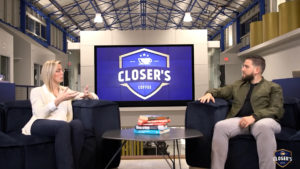“The root of human existence in business is two things: people want recognition for the work they’re doing, and they want to have valuable personable relationships. It’s an opportunity for us to evolve how those things happen.”
Todd Fleming, sports aficionado, father, and global salesman is this week’s League Leader.

Born and raised in Columbus, Ohio, Todd played college basketball and realized how much you can learn about sales from playing sports. He says “Sports teaches you discipline. The adversity you face in an athletic environment is the same as what you face in sales.”
Current Company: Legends Global Sales
Position: Vice President & GM
Intro
“When college was wrapping up, I was burnt out and just wanted to be a fan. I could have been in sports sales or entertainment sales, but I passed it up for the money. I was fortunate enough to be a part of an internet launch with a company out of Atlanta. Essentially what we were doing there was selling home décor, floor, and home office online. The process was different because the internet wasn’t the internet at the time. Us walking in with this concept was very foreign. We were speaking with a lot of owners that didn’t even have a computer on their desk. Making this kind of an educational sale was rooted in the one thing that makes sales the most successful: building rapport.
In the World Cup, the teams that are doing well are the ones that have that connection, understanding, rapport, and work together in an effective way. In Atlanta, I had to educate those who didn’t understand the platform. That’s when I knew I wanted to be in sales.”
And to the Land…
“After this, I was lucky enough to earn an entry level sales job with the Cavs (Pre-Lebron) which was unique. I was entering a situation where they weren’t a good team, the building was about 6 years old so the aura of a new building was over, and there wasn’t a real marketable player. It was important to build on the rapport side. I knew Cleveland is a huge sports town, so I knew getting the opinion of people wasn’t going to be hard. It was then turning that passion into a package or something that they would buy. For me, I just spent a lot of time understanding the business, community, and what made them tick.
We had great seats available which they couldn’t get at the time for the Indians. Our proposition was to have a good time, watch the up-and-comers, and watch THE OTHER team right? We had customizable packages which I focused on. I wasn’t the best on the phone and not necessarily the best face to face… I just outworked people I just hustled. While I was in Cleveland, I also did premium sales, general sales, ticketing, but I developed a passion to get into the management side. I wanted to play a part in the decisions that happened – the point guard in me would help and develop the careers of others.”
Next Chapter: Taking His Talents To Southbeach
“I went to Miami for the Heat right after Cleveland got Lebron James, no one knew who DWade was, and I had the opportunity to put together a team of my own under my culture and methodologies. We had a great first season and at the end of that season we got very fortunate and traded for Shaq. It was really cool to have the leverage in a city where money doesn’t matter, but it brought on new challenges. I had to let the people sell themselves out of a job because there were only a certain number of seats available in the stadium.”
Next Up: Brooklyn Followed by the Cowboys
“The NBA came recruiting and I went to work with the Nets on their move to Brooklyn. I opened up their first Manhattan sales office in their transition to the big city. Then my old boss in Cleveland took the job with the Cowboys on their new stadium project as the lead sales guy leading the campaign for the Jones family. He called me and said “You’re coming with me” and after some convo and me opening up my mind to what was being done in Dallas, I got a chance to be part of the biggest revenue project ever done in sports.”
His Airness
At that point, the idea of Legends started to be talked about at the time. I was recruited by the Charlotte Bobcats in Jordan’s quest to buy the team. It gave him the security to fund this if it was done by the right people and by the right processes. Working with him was intense. It was the same intensity that he brought onto the court and it was fun to be around an owner that was that committed.
Become Legendary
“Legends was beginning. We’re all about the entrepreneurial spirit. It launched in 2008 in preparation for the new Yankees stadium and Cowboys stadium as a food and beverage company. What we look like now didn’t come online until 2010. At that time, we launched the sales and marketing division with the 49ers project and the Rose Bowl renovation project, so two legendary brands and once in a lifetime renovation. The next big project we took on was Formula One in Austin. It diversified us. Now, we’re a global planning organization with market research, a sales entity which expands into naming rights and hospitality tours around buildings, and still a concessionaire
We also have an international division so my purview in global sales is the international world as well as professional sports. Business dev, overseeing managers, and projects in both Rome and Madrid”
Which sales team was your favorite to be a part of?
“I’m going to break this down into 2 scenarios. I believe the success a sales team has goes all the way back to the owner and the executive teams. I have 2 examples there that cannot be replaced.
- Micky Arison and his son Nick, Eric Woolworth, and Pat Riley on the basketball side: They run an organization that is about longevity, the right manner, and culturally sensitive in that city. I really enjoyed their approach for one reason: they hired people that fit the culture and could do the job. They laid out the expectations but then got out of your way. “Do your job, feel empowered.” It boiled down to the fact that the owner did not have an office in the building. The business head trusted the basketball head so much that he let him run the business and make the big decisions. That empowerment resonated within the whole organization. That was a very fun thing to be a part of at such a young age.
- Fast forward to 2007 in Dallas working with the most valuable franchise in the whole world. You would think, based on what you hear about the Jones Family, that you were stepping into this world of egotism… It couldn’t be farther from the truth. Jerry knows everybody’s name, how long they’ve been there, and what they do. He’s extremely hands-on in a very positive way. At the end of the day, Jerry is a sales guy. He was a sales guy in college, but he is a businessman. He understands both marketing and sales. To have an owner that is willing to dive in on any kind of business, support you, bring new ideas to the table, or help you get something done, was something astonishing to be a part of. To have a billionaire that is so vested was amazing. I share those because teams only have success because of the leadership styles that are there.
Back to the sales staff, it’s hard to replace what we had in Dallas. I’m not just saying that because of the revenue that was produced, but because of it was mobilizing upwards of 60 people on a project from all types of backgrounds, all with different motivations for coming into the project. Getting all these people to buy into the idea that the only thing that mattered was that this $1.4B project, that was revolutionizing sports, was successful. If it was successful, it meant it was successful for the individual. The way he was able to get everyone to drive towards this goal, the way that everyone was thinking “let’s get this right for Jerry,” ego and career advancements aside… If this project has success, it’s the greatest thing to happen to sports, which means we all get looked at differently. Those 60 people buying into that, which is the catalyst for the revenue that’s produced, is pretty unprecedented in sports and in business too.”
If you had one piece of advice for someone entering sales, what would it be?
“Transparent communication. When somebody comes into your environment as a leader, everyone is going to be questioning them, it’s only natural. Peeling back the curtain and letting them understand and play a part in the discussion around decisions helps people buy into the collective whole much quicker. Sometimes leaders are hesitant to feel like they need help. You have to get rid of that mindset. You have to have that transparency, so they can buy in. They might not like it, but if they understand why, they’ll buy in. If you do this, you are able to hold someone accountable and eliminate the back talker.”
If your sales persona could be described by an athlete, who would it be?
“I’m emotional. I’ve learned to control it as I’ve gotten older, but I would say Gary Peyton. He was one of my favorite basketball players. You go back and watch his game, his offense was productive, but not pretty. That’s how my sales were. I wouldn’t say I’m always the most fluid but it’s always productive. He was the glue to any team he was on. They called him the glove because he loved playing defense. For me, I’m never going to accept a “no’ from somebody I know should be a yes. I’m going to grind you down and I’m going to make it hard for you to say “no” to me. If I’ve done the research, figured out the backstory, and I can figure out you have the need for this, I’m going to figure out a way to get a win out of it.
The other thing that he was good at that endeared him to his teammates, was that he was known for being a talker. He could back it up because he outworked people. He understood his strengths and tried to set the game up towards his strengths but he would always be there for his team. He would start talking to someone to get them off his teammates.”
How do you overcome rejection?
“Early on, not very well. You tend to fixate on something way too much. What I’ve done over the course of time is self-evaluate my approach. You must evaluate both the approach and what was said. Ultimately, if it was a “no,” it was probably a no the moment you walked through the door for the first meeting and you just didn’t pick up on it. I think how I handle the no’s a lot better now is because I almost keep a memory bank of prior experience. When someone says this, it means that. It’s okay for you to tell me no, but you’re not going to tell me after 6 weeks. You’re going to tell me after 6 days or your buying. I guess I’ve felt more confident knowing what certain things mean in the sales cycle. The worst thing that you want to do is be stuck in limbo. You don’t want to be on a fast break where you’re the only guy back… who do you commit to?”
There must be an impact on live sports through television/streaming, right? People may rather watch from home on their TV with easy access. Is this impacting the sales process? Is that a trend?
“Through the course of my career, the first things that impacted a person’s desire to attend an event were a couple things. Cost started to go up (but cost has always been an issue). It became the abundance of flat screen TVs that were at an affordable price and that cable television was showing every game at any time. The combat to that was that the stadium experience was still relevant and drastically better than sitting on your couch by yourself, so you had to fixate people on the experience there and the emotions that came with coming to a game: driving in, getting your own parking spot, being around people.
Then, what it turned into was the development of these club spaces and private areas for business to entertain which you can’t get at home. This helped us combat that. Shortly after people didn’t want to come to games because there was a disconnect between the athletes. The people buying the tickets didn’t understand the guys or girls playing the sports. There was an age gap. There wasn’t a great way to overcome that, but we fixated on the club spaces and the additional things they could get in the stadium. That was the process of flipping over the fan base. Now I think we’ve done that. My generation is the people buying tickets and more in line with the age group.
People say millennials don’t have the attention span or millennials don’t have this or that. I actually don’t agree with any of that. I think what sporting venues allow us to do is capture this new buying category because millennials are 30 years old now. If you look at one common trait of millennials, it is that they love to be in a social setting. They collaborate in the work setting socially. It’s all about being accepted and being social. What’s more social than being around 70,000 people? We have to go to those individuals and make the sell to what’s important to them – social acceptance, coming in groups, etc. It’s a change for us because we have to educate the consumer and sometimes you have to renovate your building to accommodate for that type of stuff but it’s a big opportunity for us right now. Everything that’s a challenge is also an opportunity.”
Do you remember the first thing you ever sold?
“I went to go cut people’s grass and bag groceries. For someone to buy in and give you $5 for that, that was something special. Now I look at it with my kids. They want money but I’m not going to buy them everything that they want. Two of them have gone in together and took that to heart. Last year they started making and selling homemade popsicles. They figured it out and asked mom “hey can we pull this up on the internet and learn how to make them?”
We fronted the money to them and they paid us back (which was crazy) and each week they would go out and make their popsicles. Right when you enter our community, there’s a 4 way stop so they figured out a good place to be with shade. They made a sign. It’s some of those old tool ways on how to make money that are still important because it teaches you the work ethic, the thought process, and then you have to go market and sell yourself. It’s very fun to watch.”
Will the Flemming kids soon be looking to franchise? Stay tuned.
Who’s taking the World Cup?
“I build my work schedule around the World Cup. I make a bracket which I make my family do with me and tied with my 11-year-old on the group stage. I picked Spain to win it there. Right now, I think it’s going to be the winner of France and Belgium. I look at the term ‘connected’. The way France plays together is unbelievable.”
Enjoy this League Leaders article? Check out our others by following this link!
Have someone in mind for this segment? Let us know in the comments below or email [email protected]!
What are your thoughts? Let us know in the comments below!


